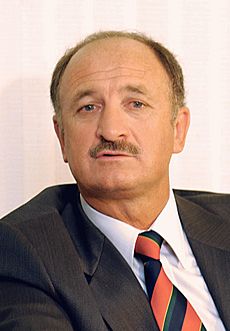Luiz Felipe Scolari facts for kids
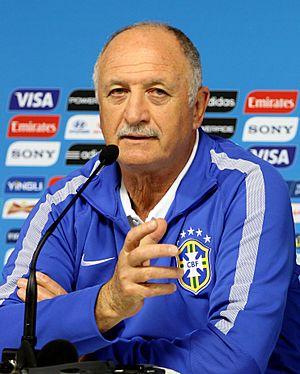
Scolari at a press conference at the 2014 FIFA World Cup
|
|||||||||||||||||||||||||||||||
| Personal information | |||||||||||||||||||||||||||||||
|---|---|---|---|---|---|---|---|---|---|---|---|---|---|---|---|---|---|---|---|---|---|---|---|---|---|---|---|---|---|---|---|
| Full name | Luiz Felipe Scolari | ||||||||||||||||||||||||||||||
| Date of birth | 9 November 1948 | ||||||||||||||||||||||||||||||
| Place of birth | Passo Fundo, Brazil | ||||||||||||||||||||||||||||||
| Height | 1.82 m (5 ft 11+1⁄2 in) | ||||||||||||||||||||||||||||||
| Position(s) | Defender | ||||||||||||||||||||||||||||||
| Team information | |||||||||||||||||||||||||||||||
|
Current team
|
Grêmio (technical director) | ||||||||||||||||||||||||||||||
| Senior career* | |||||||||||||||||||||||||||||||
| Years | Team | Apps | (Gls) | ||||||||||||||||||||||||||||
| 1966–1973 | Aimoré | ||||||||||||||||||||||||||||||
| 1973–1979 | Caxias | 67 | (0) | ||||||||||||||||||||||||||||
| 1980 | Juventude | ||||||||||||||||||||||||||||||
| 1980–1981 | Novo Hamburgo | ||||||||||||||||||||||||||||||
| 1981 | CSA | ||||||||||||||||||||||||||||||
| Managerial career | |||||||||||||||||||||||||||||||
| 1982 | CSA | ||||||||||||||||||||||||||||||
| 1982–1983 | Juventude | ||||||||||||||||||||||||||||||
| 1983 | Brasil de Pelotas | ||||||||||||||||||||||||||||||
| 1984–1985 | Al Shabab | ||||||||||||||||||||||||||||||
| 1986 | Pelotas | ||||||||||||||||||||||||||||||
| 1986–1987 | Juventude | ||||||||||||||||||||||||||||||
| 1987 | Grêmio | ||||||||||||||||||||||||||||||
| 1988 | Goiás | ||||||||||||||||||||||||||||||
| 1988–1990 | Qadsia | ||||||||||||||||||||||||||||||
| 1990 | Kuwait | ||||||||||||||||||||||||||||||
| 1990 | Coritiba | ||||||||||||||||||||||||||||||
| 1991 | Criciúma | ||||||||||||||||||||||||||||||
| 1991 | Al-Ahli | ||||||||||||||||||||||||||||||
| 1992 | Qadsia | ||||||||||||||||||||||||||||||
| 1993–1996 | Grêmio | ||||||||||||||||||||||||||||||
| 1997 | Júbilo Iwata | ||||||||||||||||||||||||||||||
| 1998–2000 | Palmeiras | ||||||||||||||||||||||||||||||
| 2000–2001 | Cruzeiro | ||||||||||||||||||||||||||||||
| 2001–2002 | Brazil | ||||||||||||||||||||||||||||||
| 2003–2008 | Portugal | ||||||||||||||||||||||||||||||
| 2008–2009 | Chelsea | ||||||||||||||||||||||||||||||
| 2009–2010 | Bunyodkor | ||||||||||||||||||||||||||||||
| 2010–2012 | Palmeiras | ||||||||||||||||||||||||||||||
| 2012–2014 | Brazil | ||||||||||||||||||||||||||||||
| 2014–2015 | Grêmio | ||||||||||||||||||||||||||||||
| 2015–2017 | Guangzhou Evergrande | ||||||||||||||||||||||||||||||
| 2018–2019 | Palmeiras | ||||||||||||||||||||||||||||||
| 2020–2021 | Cruzeiro | ||||||||||||||||||||||||||||||
| 2021 | Grêmio | ||||||||||||||||||||||||||||||
| 2022 | Athletico Paranaense | ||||||||||||||||||||||||||||||
| 2023–2024 | Atlético Mineiro | ||||||||||||||||||||||||||||||
|
Medal record
|
|||||||||||||||||||||||||||||||
| *Club domestic league appearances and goals | |||||||||||||||||||||||||||||||
Luiz Felipe Scolari (born November 9, 1948), also known as Felipão ("Big Phil"), is a famous Brazilian football manager and former player. He is currently the technical director for Grêmio.
Many experts consider Scolari to be one of the greatest and most successful football managers of all time. He played as a defender and was well-known for his time at Caxias. In 1982, he started his career as a manager.
Scolari led the Brazilian national team to win the FIFA World Cup in 2002. After this huge success, he became the manager of the Portugal national team from 2003 to 2008. He guided Portugal to the final of UEFA Euro 2004, where they lost to Greece. He also led them to a fourth-place finish in the 2006 World Cup.
Later, Scolari returned to manage the Brazil national team in 2012. He helped them win the 2013 Confederations Cup. In the 2014 World Cup, Brazil reached the semi-finals. After the tournament, he moved on to manage other clubs. In 2015, he joined Guangzhou Evergrande and won the 2015 Chinese Super League and 2015 AFC Champions League in his first year. He also won his second Brazilian league title with Palmeiras in 2018.
Scolari is a citizen of both Brazil and Italy because his family came from Italy.
Contents
Playing Career
Luiz Felipe Scolari was born in Passo Fundo, Rio Grande do Sul, Brazil. He played as a defender and was known for being tough rather than super skillful. His friends called him "Perna-de-Pau," which means "wooden leg" in Portuguese. This was a funny nickname for a player who wasn't very fancy with the ball.
Scolari followed in his father's footsteps, who was also a professional footballer. He played for clubs like Caxias, Juventude, Novo Hamburgo, and CSA. He often served as the captain of his teams. His biggest win as a player was the 1981 Campeonato Alagoano with CSA.
Managerial Career
Early Coaching Days
After he stopped playing football in 1982, Scolari became the manager of CSA, his old club. He won the Alagoas state championship in his very first season as a coach.
He then managed several other teams, including Juventude (twice), Brasil de Pelotas, Pelotas, and Al Shabab in Saudi Arabia. In 1987, he joined Grêmio and won the Gaúcho state championship.
Scolari also coached in Kuwait for two years with Qadsia, winning the Kuwait Emir Cup in 1989. He then briefly managed the Kuwait national team and won the 10th Gulf Cup. He returned to Brazil to coach Criciúma and led them to win their first big national title, the 1991 Copa do Brasil.
Success with Grêmio
In 1993, Scolari returned to Grêmio. Even though his team won many games, some people in Brazil criticized his style of play. They thought it was too focused on winning and not "Brazilian" enough.
However, he won six titles in just three years with Grêmio. This included the 1995 Copa Libertadores, a very important South American club competition. His team then played in the Intercontinental Cup but lost to Ajax from the Netherlands. The next year, they won the Brazilian Championship. His team didn't have huge superstars but relied on hard-working players.
Time at Palmeiras
After a short time in Japan, Scolari became the manager of Palmeiras in Brazil. In three years, he led Palmeiras to win the Copa do Brasil, the Mercosur Cup, and their first Copa Libertadores title in 1999. They also finished second in the Intercontinental Cup against Manchester United. He was named the best coach in South America in 1999.
Managing Brazil (First Time)
In June 2001, Scolari was chosen to manage the Brazilian national team. Brazil was struggling to qualify for the 2002 FIFA World Cup. Despite losing his first match, Scolari successfully guided the team to qualify for the tournament.
Before the 2002 World Cup, Scolari made a tough decision not to include the famous striker Romário in his team, even with a lot of public pressure. Brazil was not expected to win the tournament, but they surprised everyone. They won all their matches, beating teams like Turkey, China, Costa Rica, Belgium, and England. In the final, they defeated Germany 2–0 with two goals from Ronaldo. This win gave Brazil their fifth FIFA World Cup title. Scolari left the team in August 2002.
Coaching Portugal
In November 2002, Scolari became the coach of Portugal. Portugal was hosting UEFA Euro 2004. Some people didn't like that a foreign coach was hired, and Scolari also caused a stir by calling up Brazil-born Deco to the team.
At Euro 2004, Portugal reached the final but surprisingly lost 1–0 to Greece. Scolari then led Portugal in the 2006 World Cup in Germany, where they made it to the semi-finals. They lost to France and didn't reach the final. Scolari also managed Portugal in UEFA Euro 2008, where they were knocked out by Germany in the quarter-finals. After this, he announced he would join Chelsea.
Time at Chelsea
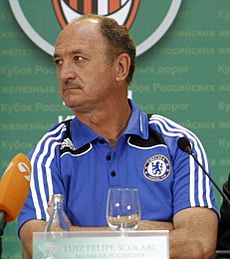
Scolari became Chelsea's manager on July 1, 2008. He was the first World Cup-winning manager to coach in the Premier League. He signed Deco, a player he knew from the Portugal team. Under Scolari, Chelsea had a big 5–0 away win against Middlesbrough in October 2008.
However, Scolari was fired from Chelsea on February 9, 2009. This happened after a period of poor results, including a loss to Liverpool and a draw with Hull City. The club said his team's performance was getting worse at a key time.
Return to Palmeiras
On June 13, 2010, Scolari was announced as Palmeiras' new manager for a second time. He led them to win the 2012 Copa do Brasil. In September 2012, he left the club after some disappointing results in the league.
Managing Brazil (Second Time)
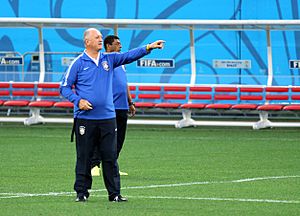
In November 2012, Scolari returned to manage the Brazilian national team for a second time. His main goal was to win the 2014 FIFA World Cup, which Brazil was hosting.
Under Scolari, Brazil won all their games in the 2013 FIFA Confederations Cup. They beat Japan 3–0, Mexico 2–0, and Uruguay 2–1 in the semi-final. In the final, Brazil defeated Spain 3–0, with goals from Fred and Neymar.
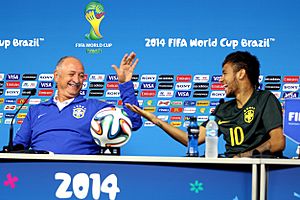
Brazil reached the semi-finals of the 2014 FIFA World Cup. However, they suffered a shocking 7–1 defeat against Germany. This was Brazil's biggest loss ever at a World Cup and their first home loss in a competitive match since 1975. Scolari said it was "the worst day of [his] life" and took responsibility for the loss.
After another 3–0 defeat to the Netherlands in the third-place playoff, Scolari resigned as Brazil's manager on July 14, 2014.
Later Club Management
Scolari had a third period as manager of Grêmio from 2014 to 2015. He then moved to China to coach Guangzhou Evergrande in June 2015. In just four months, he led them to win the 2015 Chinese Super League and the 2015 AFC Champions League. He continued to lead Guangzhou to win three league titles in a row from 2015 to 2017.
In 2018, Scolari returned to Palmeiras for a third time, winning his second Brazilian league title that year. He later managed Cruzeiro again in 2020-2021 and had a fourth stint at Grêmio in 2021.
In 2022, Scolari joined Athletico Paranaense as a technical director and manager. He led them to the 2022 Copa Libertadores final, where they lost to Flamengo. He then became solely a director. In 2023, he took on a coaching role again at Atlético Mineiro, leaving in March 2024.
Style of Management
Scolari is known for his unique and strong coaching style. People often call him "Big Phil." In the early part of his career, he was known for a very direct and tough style of football. However, in the 1990s, his teams started playing a more exciting and attacking game.
He was also very good at building team spirit and motivating his players, sometimes using ideas inspired by religion. He tried to protect his teams from too much media attention. His relationship with the press was sometimes difficult because he was very passionate and could be temperamental.
Scolari was known for being flexible with his tactics, using different formations like 4–3–2–1, 3–4–1–2, and 4–3–3. He often gave his players a lot of freedom on the field. Midfielders and wingers were very important in his attacking plans.
When he managed Brazil in 2002, he used a 3–5–2 formation with attacking wing-backs like Cafu and Roberto Carlos. This helped his talented forwards like Ronaldo, Rivaldo, and Ronaldinho shine. His teams were also good at quick counter-attacks.
With Portugal, Scolari's teams played an entertaining style based on passing, showing off his players' skills. He also focused a lot on tactical preparation and the mental side of the game. Deco, a former Portugal midfielder, praised Scolari for his ability to motivate the team.
In his second time managing Brazil, Scolari used a flexible 4–2–3–1 formation. He successfully stopped Spain's strong passing game in the 2013 Confederations Cup final by having his team press hard. He also used a strong defense and hard-working midfielders.
Personal Life
Scolari has Italian citizenship because his family came from Italy. He is a big fan of Grêmio, the Brazilian club. He is also a Roman Catholic.
People sometimes say Scolari looks like the actor Gene Hackman or Marlon Brando's character Don Vito Corleone from the movie The Godfather. In Brazil, he is known as "Felipão," and when he was at Chelsea, he was sometimes called "Big Phil."
Honours as Player
- Campeonato do Interior Gaúcho: 1973, 1975, 1977, 1978 (with Caxias do Sul)
- Campeonato do Interior Gaúcho: 1980 (with Novo Hamburgo)
- Campeonato Alagoano: 1981 (with CSA)
Honours as Manager
Club Titles
- Campeonato Alagoano: 1982 (with CSA)
- Campeonato do Interior Gaúcho: 1983 (with Brasil de Pelotas)
- Kuwait Emir Cup: 1989 (with Qadsia)
- Copa do Brasil: 1991 (with Criciúma)
- Campeonato Catarinense: 1991 (with Criciúma)
- Campeonato Gaúcho: 1987, 1995, 1996 (with Grêmio)
- Campeonato Brasileiro Série A: 1996 (with Grêmio)
- Copa do Brasil: 1994 (with Grêmio)
- Copa Libertadores: 1995 (with Grêmio)
- Recopa Sudamericana: 1996 (with Grêmio)
- Campeonato Brasileiro Série A: 2018 (with Palmeiras)
- Copa do Brasil: 1998, 2012 (with Palmeiras)
- Copa Mercosur: 1998 (with Palmeiras)
- Copa Libertadores: 1999 (with Palmeiras)
- Torneio Rio-São Paulo: 2000 (with Palmeiras)
- Copa Sul-Minas: 2001 (with Cruzeiro)
- Uzbek League: 2009 (with Bunyodkor)
- Chinese Super League: 2015, 2016, 2017 (with Guangzhou Evergrande)
- AFC Champions League: 2015 (with Guangzhou Evergrande)
- Chinese FA Cup: 2016 (with Guangzhou Evergrande)
- Chinese FA Super Cup: 2016, 2017 (with Guangzhou Evergrande)
International Titles
- Arabian Gulf Cup: 1990 (with Kuwait)
- FIFA World Cup: 2002 (with Brazil)
- FIFA Confederations Cup: 2013 (with Brazil)
Individual Awards
- Best Football Coach in Brazil: 2018
- Brasileirão Coach of the Year: 2018
- South American Coach of the Year: 1999, 2002
- IFFHS World's Best National Coach: 2002
- Chinese Super League Coach of the Year: 2015, 2016
Images for kids
-
Scolari managing Brazil at the 2014 FIFA World Cup
See also
 In Spanish: Luiz Felipe Scolari para niños
In Spanish: Luiz Felipe Scolari para niños
 | Jewel Prestage |
 | Ella Baker |
 | Fannie Lou Hamer |


